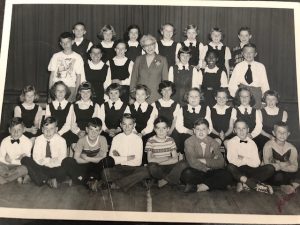1954: Maxine Alexander is the only person whose name I remember of my Grade 4 classmates. Why? Because it was my first experience witnessing another student being bullied, taunted, humiliated and diminished by other young students. Maxine was a black Canadian. I didn’t know that the behavior of my classmates was called racism, or racial discrimination, or racial prejudice. As a 9 year old child, I just knew that it was mean, unkind, and wrong.
I befriended Maxine. I remember playing soccer with her at recess when she was not chosen to be on a team, and I would walk home with her after school. Although I do not remember any actual conversations with Maxine, I do remember that I felt sad for her, very sad. I remember feeling sad when she was called hurtful, racist names; not chosen to be on a team; and not invited to birthday parties.
Did these experiences cause her to have health problems? Most likely. Maxine could easily have suffered with anxiety, stomach aches, and/or poor grades at school. Her body, her soul must have been impacted by the negative and hurtful words and actions of my classmates.
I do not know how life evolved for Maxine as the next year my family moved from Winnipeg to Calgary, Canada. But I have never forgotten her and this experience influenced me throughout my childhood. So much so, that as a child If negative things were said in my presence about someone of color, I would start to cry. Maybe I was crying for Maxine.
 In my school photo, you can see Maxine in the second row. Can you imagine the challenge in 1954 being the only black student in a very white school? As for me, I’m sitting in front of my teacher, Mrs. Wheeler, with squinty eyes because I didn’t wear my glasses.
In my school photo, you can see Maxine in the second row. Can you imagine the challenge in 1954 being the only black student in a very white school? As for me, I’m sitting in front of my teacher, Mrs. Wheeler, with squinty eyes because I didn’t wear my glasses.
2020: Over these past few months, the world has been dealing with the virus Covid-19. But we are still dealing with the virus of racism in my country of Canada and many others in our world. The horrific killing of George Floyd in the USA, has triggered uprisings and protests around the world calling for more just and equal treatment of our black brothers and sisters. In 2020, we clearly know that there is a strong connection between racism and health problems.
This tragedy has invited me to reflect on my own white privilege as a Canadian senior woman. I responded well with my first encounter of racism as a child by befriending my black friend. But I can conjure up other instances in my adult life that I now recognize as my own direct and nuanced racial discrimination that I would not be so proud to share. I want and will do better.
In my professional life, my focus is on strengthening and healing families who are suffering with serious illness. The protests around the world though have given me pause to consider how I might do more in my family nursing clinical practice to help families of color suffering with health problems, perhaps in part due to racism.
Racial differences are not problems as such but rather prejudice, discrimination, and other types of intercultural aggression or suppression based on these differences become the problem. More human and clinical curiosity needs to be evident. We need to understand more about the connection between racism and health problems. When working with families of color seeking assistance to manage a serious illness, it can start with a simple question of “Have you experienced discrimination because of your race? If so, do you believe it has affected your health?” “Could you help me to understand your experience so that I may best help you?” I also want to be better and do better professionally.
I am heartened that worldwide social unrest may become a watershed moment for those of us who are health professionals. We now have the opportunity to shine a light on the connection between racial discrimination and health problems. We can soften illness suffering; strive for therapeutic conversations of respect and understanding, and offer interventions that will enhance family health and healing. We can do our part to squash and minimize the effect of racism on health.
Finally, I’m thankful to Maxine Alexander, wherever she may be, for her willingness to be my friend. I hope and pray her life has mostly been filled with joy and love. Black lives matter.
One Response to “Maxine Alexander: My First Black Friend; Racism & Health Problems”
You speak for many and me too, Lorraine – so well expressed and true, thanks for this touching contribution.